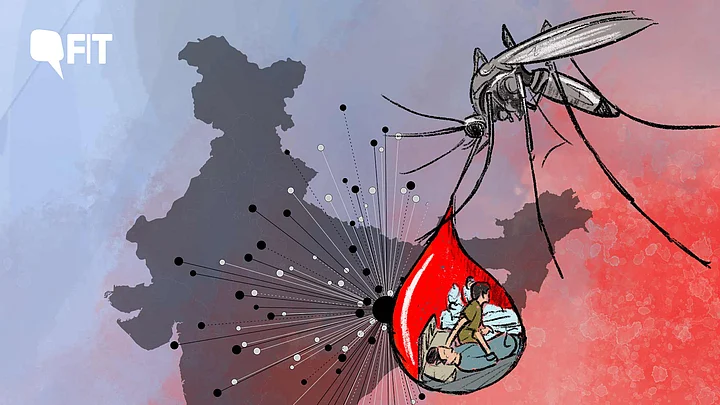Monsoon is finally here, and with it, once again, comes a rise in cases of dengue.
Many parts of India, including Kerala, Odisha, and Assam are already recording an uptick in dengue cases, with health authorities calling for stringent preventive measures.
Is the Dengue Virus Changing?
According to the experts we spoke to, dengue tends to resurface every monsoon, so a spike in cases this time of the year isn't particularly unusual or alarming.
However, a recent study led by the Indian Institute of Science (IISC) suggests that the virus is evolving dramatically in the Indian subcontinent.
In a nutshell, there are four serotypes of the dengue virus (DENV-1,2,3,4). According to the researchers of the study, DENV 1 and DENV 3 were the dominant strains in India until about 2012.
However, DENV 2 — which is more likely to result in severe symptoms compared to the other three — has become more dominant in recent years. This is also the stereotype that is currently spreading in Kerala.
Doctors on the ground treating patients attest to this as well.
"The most striking thing about dengue this time is that, unlike last times, we are seeing a drop in the white blood cells count," said Dr Dibyendu Mukherjee, Consultant Internal Medicine, Fortis Hospital, Kolkata, speaking to FIT for a previous article.
"That is something unique from the last two years, because if the WBC count drops they become susceptible to other infections too," he added.
‘Protect Yourself’: Advise Health Authorities
Speaking to FIT, Dr Ajay Aggarwal, Director, Internal Medicine, Fortis Hospital Noida said, "we haven't started getting any dengue cases yet. But we expect them to start rising around the last week of July, towards the end of the monsoons."
Anticipating the cases to go further up in the next few weeks, health authorities are taking steps to prevent the spread of dengue.
Director of Public Health, Odisha, Niranjan Mishra, issued a Standard Operating Procedure (SOP) on 2 July, to hospitals to keep adequate medicines, platelet stocks, testing kits, and beds available.
"Certain areas have been identified as hotspots and BMC personnel are giving stress on clearing them," Bhubaneswar Municipal Corporation (BMC) Health Officer, Dipak Bisoi was quoted as saying by PTI.
Speaking to the press in June, Kerala Health Minister Veena Georga said the state is on high alert.
She also asked government offices, schools, and houses to observe ‘dry days’ to manage stagnant water in these areas.
On a personal level, the Ministry of Health and Family Welfare (MoHFW) recommends the following protective measures to prevent mosquito bites that can cause dengue,
Use mosquito repellent - particularly on your hands and feet
Use mosquito nets while sleeping
Do not wear clothes that expose arms and leg (especially children)
Remove water from coolers and other small containers at least once in a week
Be especially vigilant in the morning, because Dengue mosquitoes are known to bite early in the morning
Seek medical help if you or someone close to you develops a high fever
accompanied with headaches, pain behind eyes, nausea, swollen glands, joint or muscle pains, or rashes on the body
(Written with inputs from PTI, IANS, and Times of India.)
(At The Quint, we question everything. Play an active role in shaping our journalism by becoming a member today.)
